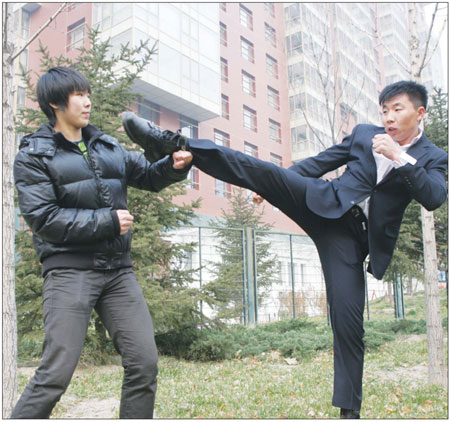Bodyguard demand surges in China
Updated: 2010-12-03 11:26
(China Daily European Weekly)
|
|||||||||||
 |
| China's nouveau riche are creating an increasing demandfor protection services. [Feng Yongbin / China Daily] |
Demand for personal security services is rising, Ttanks to growing middle Class wealth and the expanding Rich-Poor divide.
Zhang Li turned around and looked at the two muscular men hiding in the shadows, trying to act inconspicuous. Although they pretended to be reading newspapers, she knew they were watching her every move. "I call them shushu, my uncles,?smiles the 7-year-old. Her mother calls them her bodyguards. With her rosy cheeks, pigtails and bright pink rucksack, Zhang looks like every other first-grader as she skips through the gates of her primary school in downtown Shanghai. What sets her apart is her entourage. "We're her secret escorts,?says Zhou Jie from CCG Security, the company hired to protect the girl from her father. In the past two years, the 26-year-old martial arts expert has guarded visiting royals from the Middle East, celebrities and company CEOs, "but this is the first time I've protected an ordinary family? he says.
Once the preserve of the rich and famous, a shift in China's traditional customer base has led to a boom in demand for bodyguards.
As the nation's wealth has grown, Chinese security firms say they are witnessing a surge in middle-class families using their services.
CCG Security, one of the market leaders, produced bodyguards to at least a dozen clients with annual salaries of roughly 400,000 yuan (46,000 euros) last year. In the past 12 months, that client list has more than trebled.
"More people are calling all the time," says Zhou, who explained that most inquiries are about temporary protection during a family or property dispute.
Zhang Li's mother (who did not want her daughter's real name used), a manager at a multinational company, called after a bitter breakup from her husband.
She hired four bodyguards to watch the schoolgirl around the clock in pairs, with each receiving 200 yuan an hour.
They were given pictures of several people forbidden from coming into contact with Zhang and told to "be invisible" unless called on.
"The furious father arrived one day and tried to get into their apartment," Zhou says.
"We ushered him out (of the building) and persuaded him to leave."
On a previous assignment, Zhou and four colleagues guarded the wife and child of a 40-year-old man whose pregnant mistress had threatened to expose their affair.
After two weeks, the mistress "gave up and agreed to have an abortion", recalls Zhou.
Zhang Hong, a professor at the Chinese People's Public Security University, says he believes demand for such services will only increase in the future.
"We'll soon be seeing bodyguards accompanying elderly women to the bank, escorting office women as they house hunt or guard children while their parents are away," he says.
Experts say the growing ranks of nouveau riche have a greater awareness about safety, although many predict that conflicts between individuals and businesses will only increase as society develops and the wealth gap widens.
"No people are more satisfied (with their living standards); they care more about safety," Zhang Hong says.
Jin Yi Safety and Guard Technology, also in Shanghai, has received several calls this year from wives looking for protection as they divorce violent husbands.
Two company employees also recently accompanied a homeowner to reclaim a property from tenants who refused to leave.
This diversity in customer requirements, which has been steadily growing over the past few years, follows a trend seen across the globe, according to a Jin Yi manager who gave his name as Feng.
"Our clients are usually white-collar workers who have a higher than average income," he says.
Private bodyguard services are also coming to the rescue in cases that are outside the remit of public security bureaus.
In September this year, a Shanghai man hired guards for his wedding banquet to stop his ex-girlfriend from ruining the event.
Although the groom had received threats from the woman, experts say police are powerless to act unless a crime is actually committed.
"When people feel the threat but have no evidence, the authorities can't intervene," says Fang Fulai at Changhang Security, a Shanghai-based firm with about 6,000 employees.
"But bodyguards are more experienced in dealing with disputes and can cater to specific needs."
Among the burgeoning markets for security firms today are lawyers, who are often faced with intimidation and violence.
Wu Dong, at the Shanghai Bar Association, says although none of his colleagues has hired bodyguards, he knows of several who have been attacked by people involved in cases they are handling.
"We recently accompanied a (defense) attorney to a hearing in Jiangsu province in East China," says Cheng Guanyao, a department manager for CCG Security.
"The accused had hired people to threaten him and we were there to make sure he got him through the emergency gate safely."
Depending on the quality, security services are relatively inexpensive, with companies offering guards for as little as 100 yuan a day. However, the more the danger, the higher the price.
Chai Chang raised her right hand to show China Daily a long scar that runs along the tips of three fingers. She received the wound in October after tackling a thief.
"Of course, there are dangers. Otherwise why would people pay us to protect them?" asks the 25-year-old, who has worked for Tianjiao Security in Beijing for more than a year.
Looking at her scar, she adds: "It's only a minor injury. They're common. Some of my colleagues have suffered much worse."











